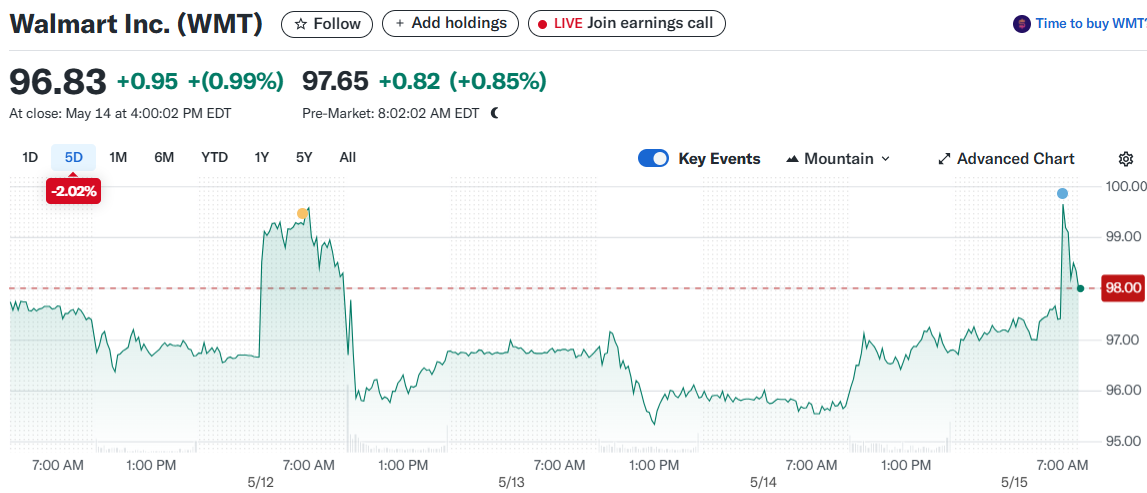TLDR:
- Walmart reported Q1 earnings of $0.61 per share, beating analyst estimates of $0.58
- U.S. same-store sales rose 4.5%, exceeding projected 3.9% increase
- Company maintained full-year outlook but warned of “substantial uncertainty” from economic conditions
- Walmart stock rose 2.9% in premarket trading following the results
- The retailer faces challenges from new tariffs, with imported goods accounting for about a third of U.S. sales
Walmart reported stronger-than-expected first-quarter earnings on Thursday, sending shares higher in premarket trading as the retail giant continues to navigate economic headwinds and tariff pressures.

The discount chain posted adjusted earnings of 61 cents per share for the quarter ended April, surpassing analyst expectations of 58 cents according to FactSet.
Revenue increased by 2.5% year over year to $165.6 billion, aligning with consensus estimates.
U.S. same-store sales showed a robust performance, rising 4.5% compared to the same period last year. This growth exceeded analyst projections of a 3.9% increase.
Walmart maintained its full-year outlook, forecasting net sales to increase between 3% and 4% from the prior year. The company also kept its earnings per share guidance at $2.50 to $2.60.
For the second quarter, Walmart expects sales to grow between 3.5% and 4.5%, slightly above analyst estimates of 3.4%.
However, the company chose not to provide specific guidance on income growth or earnings per share for the second quarter, citing uncertainty.
Tariff Challenges Ahead
The retail giant faces potential headwinds from recent trade policy changes. New tariffs have been implemented since Walmart’s last quarterly report, including a 10% baseline tariff on most imports.
Higher tariffs on products from Canada and Mexico have also gone into effect. Chinese imports, which were temporarily subject to a 145% levy, now face a reduced but still substantial 30% tariff following a recent agreement with the Trump administration.
This trade environment creates challenges for Walmart, as imported goods—primarily from China and Mexico—accounted for approximately one-third of the company’s U.S. sales last year.
Despite these pressures, Wall Street analysts remain confident in Walmart’s ability to handle tariff impacts.
BofA Securities analyst Robert Ohmes points to several factors working in Walmart’s favor: its massive scale, strong supplier relationships, automation efforts, growing third-party marketplace, and alternative revenue streams like advertising.
Pricing Strategy Remains Flexible
At its investor day in April, Walmart management discussed various strategies to offset tariff impacts, including sourcing more products domestically from the U.S.
Chief Financial Officer John David Rainey explained the company’s decision to withhold specific second-quarter guidance: “Given the dynamic nature of the backdrop, and the range of near-term outcomes being exceedingly wide and difficult to predict, we felt it best to hold from providing a specific range of guidance for operating income growth and EPS for the second quarter.”
Rainey also indicated that Walmart sees “opportunities to accelerate share gains” and intends to maintain flexibility in its pricing strategy.
Investors will be eager for more details during Walmart’s scheduled earnings call, particularly regarding the company’s approach to managing tariffs and any observed changes in consumer demand patterns.
Shares of Walmart were up 2.9% to $99.37 in premarket trading Thursday. The stock has gained about 6% year-to-date but remains nearly 9% below its mid-February record high.
Options pricing suggests traders are betting on a potential 5% move in either direction following the earnings report, which could push the stock to its highest level since February when shares fell after Walmart’s first-quarter outlook disappointed investors.
Analyst sentiment remains overwhelmingly positive, with all 19 analysts tracked by Visible Alpha rating Walmart stock a “buy.” The average target price of $111 represents nearly 16% upside from Tuesday’s close.
Walmart’s most recent quarter demonstrated the retailer’s resilience in a challenging economic landscape, though the company continues to face uncertainties from global economic conditions, tariff policies, and shifting consumer demands.






